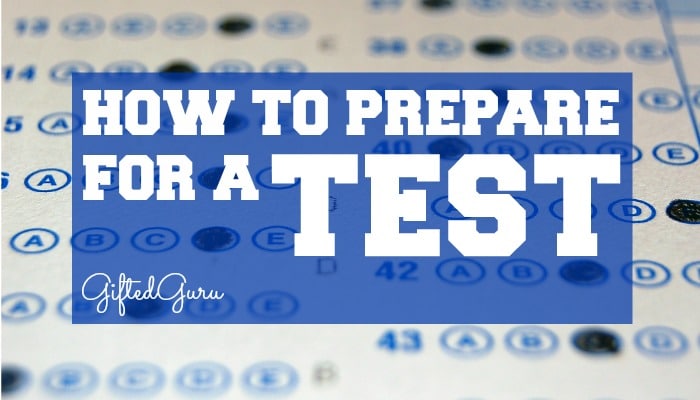
How to prepare for a test is something that can challenge anyone at any time. I’m 49, and I’m still taking tests! In fact, I have to take a big test very soon, and I thought I’d share the strategies and plan I use for how to prepare for a test.
In the gifted community, it’s common to hear the refrain that gifted kids are often so clever that they don’t ever need to figure out how to prepare for a test. This always makes me itchy because it’s so ridiculous.
Show me someone who can take AP Biology and never study. Please. Now, sometimes people don’t have good study habits, and some people require less studying than others, and some teachers have tests that are so aligned with lecture that you don’t have to do much to prepare for them if you paid careful attention in class, yet at some point, if you’re doing well on tests, it’s because you know how to prepare for a test.
The Test I’m Taking
I am not certified to teach 7th grade. It’s only grade from preschool through 12th that I’m not certified to teach, and this must be rectified. So, I’m taking this big test that will certify me to teach English and Social Studies in grades 4 – 8 (so there will be some overlap). There’s a lot of content there, because the Social Studies part includes geography, economics, state history, world history, American history, and more. The tips for how to prepare for a test that you see below are the steps I’m taking for this particular test, and the ideas work for virtually every test you might need to take.
Step 1: Know Your Enemy
The first thing to do is to gather all the information you can on the test itself. I read through the study guide provided by the great state of Texas. I read carefully, and if I found myself skimming, I would force myself to go back and slow down.
I wanted to know how many questions there would be, what type of questions I would face, how long I would have to take the test, and the content that would be on the test.
If there hadn’t been a formal discussion of the test, I would have found out all I could from informal sources. Sometimes in a class, for example, teachers will give a review or will have discussed the format in the syllabus.
As I read through the information, I looked up any terms I wasn’t familiar with at that time to see if I really didn’t know it, or if I were just unfamiliar with that particular term.
Step 2: Gather Your Materials
Once I have a handle on what I’m facing, I decide on the formal materials I’ll need to prepare.
For this test, I bought a study guide. I’m not going to link to it because it was terrible. I bought a set of flashcards. They were also, unfortunately terrible.
Terrible materials notwithstanding, they’re still helpful as a place to start.
I make sure I have at least two practice tests in my prep materials.
The bigger and/or more important the test, the more materials I will need. In college, I would often just need my notes and the text book. Sometimes, I would also need a study group or to create flash cards.
Step 3: Strategize
Look at the materials you have and decide the best strategies for reviewing them.
I typically plan to do this:
- do a quick skim of all of the materials
- read through all of the materials more carefully
- practice with flashcards (if I have them)
- take two practice tests
- do a final skim
I do that first skim for a particular reason. The brain respects information it’s heard before, so I want to skim the information before the more careful read to send a signal to my hippocampus that says, “Seriously, I really need to know this. Pay attention.”
It also serves as a scaffold. It’s like the framing of a house, and it gives structure to the reading I will do after that.
I take two practice tests, one part way through the preparation, and one at the end of the preparation to get a good feel for areas of weakness, but also areas of strength, so I know better where to focus my energy and time.
Step 4: Set Up a Schedule
I look at the amount of material I have to cover and the amount of time I have before the test. I then use simple division to figure out how much material to cover every day to make sure I’m ready. I leave a nice cushion for when something comes up that interrupts my plan.
I type the schedule up in a chart, and I check off every day as I complete the work for that day. I build in little rewards for myself as I progress through the chart.
Step 5: Immerse Yourself
In addition to the formal materials and schedule, I do a lot of informal preparation. I immerse myself in the material. This means that I:
- listen to podcasts on the topic
- watch TED talks about it
- watch YouTube videos about it
- borrow books from the library about it (particularly ones for kids and including novels)
- put books on my phone to listen to about the topic
- follow Twitter and Facebook accounts related to the topic
For my current test, I’m watching the whole series of videos that an educator named Keith Hughes has created. This lets me prepare while I do other chores, or even get ready in the morning.
As I watch his videos, the topics brush up against the reading and listening I’m doing, and the secret prep sauce is found there – in the layering of the ways you are taking in the information.
Think of it this way: if you use perfume, it will last longer if you layer the scent – if you use the bath gel and then the lotion and then the perfume.
The same is true for thinking. Sending the information to your brain in different ways layers your learning. I’m hearing, seeing, and reading the information. If I make my own flashcards, I’m also writing the information.
Step 6: Avoid Mental Games
I don’t let test anxiety get the best of me. I know that some anxiety is normal and actually helps me prepare better. I visualize the chemicals flowing around my brain, preparing me for mental combat.
Want to know more about this? Read Top Dog. You can read my review here.
I don’t do that hedge-your-bet thing where you tell everyone, including yourself, that you know you won’t do that well.
People do this because they don’t want to be disappointed if they don’t get the results they want, but it’s not helpful. That negativity isn’t the mindset you’re looking for. Instead, say, “I’m preparing well, and I will do my best.” That’s all you can do.
Saying, “I know I’m going to fail” or “It will be a miracle if I pass” is not helpful to anyone. Feel confident that you have done what you can and don’t be an annoying, falsely self-deprecatory person who exhausts everyone around them. Don’t be that guy.
Step 7: The Final Countdown
I do all the things they tell you to right before the test – I try to get a good night’s sleep (no all-night study sessions), I eat well, I bring lots of extra pencils and paper if it’s a written test, and I remind myself that I have prepared well.
I only do one extra thing: I type up a one-page outline of the material, focusing on areas that have thwarted me in the pre-tests. I look over just this page on the day of the test. It keeps me from getting overwhelmed.
When I get the results back, I analyze them carefully, no matter how well I do. I want to know what worked and what didn’t. Did I do well on the places I thought I would? Did I miss questions because I got caught by distractors? Was there anything I could have done to do better?
If I have to take the test again, I focus my study only on the areas I didn’t do well on, just skimming the material I had already mastered.
So those are my tips for how to prepare for a test! If you’re taking a test, I wish you the best! If you have other tips, I’d love to hear them!
P.S. A special thanks to Keith Hughes, whose videos have taught and entertained me, as well as inspired me to make some changes in my teaching practice.






